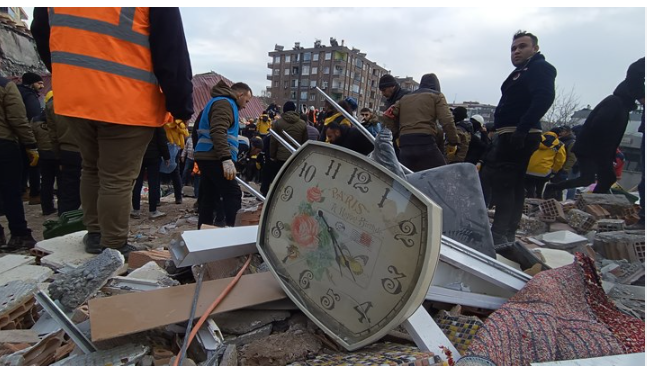In the 25th anniversary of the grand tremor that hit Marmara Sea, causing massive damage in estuary cities, led by Istanbul, the AK Party government continues to pay lip service to mitigation measures, but spends very little of it. Needless to say, Turkish and international press is full of articles reflecting damage estimates, when (not if) a seconds 7+ quake strikes Istanbul and other major cities around the densely populated Marmara Sea, also Turkey’s industrial hub.
Earthquakes are unpredictable but also inevitable, and experts say Istanbul might be due one. After the devastation last year in the southeast of the country and criticism the authorities weren’t prepared, banks are now getting ahead on contingency planning. That includes establishing teams in shadow offices in the capital Ankara to ensure continuity should disaster strike, is the Bloomberg take of the quake risk, which mostly focuses on banks taking precautions.
“Given Istanbul’s critical role in Turkey’s industry, it’s essential to assess the potential losses in the event of an earthquake and to implement industrial earthquake risk management plans at national, local, and enterprise levels without delay,” said Nurcan Meral Ozel, a professor at the Kandilli Observatory and Earthquake Research Institute in Istanbul.
The institute expects a quake of 7.33 magnitude to hit at some point, based on a series of calculations using historical precedent. The Disaster and Emergency Management Presidency, meanwhile, is preparing for a 7.5 magnitude quake, only slightly smaller than the ones that hit the southeast in February last year.
The Chamber of Chemical Engineers of Istanbul drew attention to the chemical-related risks of a potential earthquake. Accordingly, the megacity must prepare to minimize collateral damage in an earthquake that the experts estimate could result in massive fatalities, reports Duvar English.
Below is the scariest warning from the news report:
Accident scenarios and models included in the report warned that damage to or leakage from Toluene Diisocyanate (TDI) tanks stored in Istanbul and Kocaeli during an earthquake could cause permanent organ damage, respiratory issues, asthma attacks, and skin irritations. The report stated that all living beings within 50 meters of a TDI tank would die, with the risk extending up to 80 meters.
A similar model was created for LPG tanks in Ambarlı, Marmara Ereğlisi, Kocaeli Yarımca, and Körfez districts in the Marmara region. According to this model, an explosion could generate a fireball reaching up to 1,000 meters. The heat energy from this fireball could be felt by anyone within 2,500 meters of the tank, potentially causing deaths and first-degree burns.
Turkey’s environment minister, Murat Kurum, has warned that 600,000 houses in İstanbul have been identified as being at risk of collapsing in the event of a massive earthquake that seismologists predict is likely to strike the city of 16 million by 2030, the state-run Anadolu news agency reported on Friday.
Attesting to the fatalism of Turkish people at large, according to information from the Istanbul Metropolitan Municipality, 79,000 out of 162,000 buildings in Istanbul couldn’t undergo the free “rapid screening and building test” for earthquake risk because not all owners provided consent.
Two out of every three buildings in Istanbul were built before 2000. Approximately 1.3 million of 6.8 million residences are risky. After the 1999 earthquake, only a quarter of the residences that needed to be converted could be converted, according to Istanbul Planning Agency, an affiliate of Grand Istanbul Municipality.
“We can predict that around 4 to 5 million Istanbulites will lose their homes after the earthquake,” Agency head Gokce said in an interview with EPA Images.
Gokce highlights that “according to the scenarios prepared together with the Kandil Observatory, we estimate that around 90,000 buildings in Istanbul will collapse in a possible earthquake. That is neither optimistic nor pessimistic. These are real numbers that we have to prepare for as possible data.”
Other sources, such as business associations had put the potential damage from a second Grand Quake, at $100 bn, or ca 9% of 2024 GDP of the country.
Follow our English language YouTube videos @ REAL TURKEY: https://www.youtube.com/channel/UCKpFJB4GFiNkhmpVZQ_d9Rg
And content at Twitter: @AtillaEng
Facebook: Real Turkey Channel: https://www.facebook.com/realturkeychannel/
